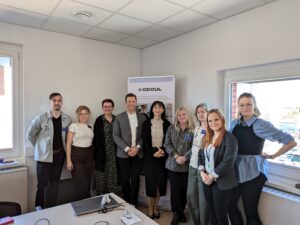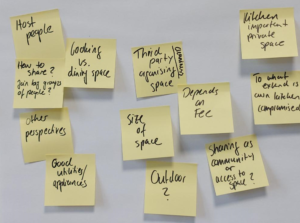
Like in the Netherlands and Sweden, Slovenia also hosted two focus groups in Ljubljana to explore people’s preferences and experiences in when it came to sharing a work-study space, a kitchen, a workshop space, a toolbox, and a cargo bike with their neighbours.
One group consisted of parents with small children, while the other included people whose children had grown up or moved out. The majority of participants lived in urban areas in diverse types of dwellings including apartments, houses or row-houses.
The discussion revealed these key insights:
Work-Study Space: Most participants were not interested in this type of a shared service due to a well-established network of libraries across Slovenia, which also offer study and reading spaces. The other significant finding was that they preferred to read and work in the comfort and privacy of their own home, no matter how small or crowded the living space might be.
Shared Kitchen and Dining: The two groups were almost evenly split on the idea of sharing a kitchen and a dining space. Some participants viewed cooking and dining as a social activity and welcomed the opportunity to share these experiences. Others, however, considered the kitchen a private and personal space. Some brought up negative experiences with cleanliness in communal kitchens at workplaces or student-dorms kitchens, but were overall interested, if a clear system was in place to maintain order, tidiness and cleanliness of the space. There was also some enthusiasm for a shared space that could host larger gatherings or provide opportunities to meet with neighbours.
Shared Workshop Space: This space generated most interest from the participants, especially those living in apartments who often lack the space to keep tools or work on larger projects. Participants expressed interest in a place where people could work together, share ideas, and help each other. One concern was the upkeep and safety of tools available in the workshop.
Shared Tool and Appliance Box: Similar to the shared workshop space, participants’ primary concern was the upkeep and safety of the tools available. However, if regular maintenance was guaranteed as part of the service cost, the idea was well supported. Especially as a strategy against consumerism and a point of access to higher quality tools they wouldn’t otherwise own.
Shared Cargo Bike: In Slovenia, the cycling infrastructure is not developed enough to allow for safe and easy cycling, even within larger cities. Therefore, the idea of a larger, heavier cargo bike did not seem safe or practical to participants. While some answered with “Why not?” to the idea of sharing a cargo bike, most preferred their own car or bike for transportation.
General Comments: Issues of safety, availability, comfort, and upkeep all played a role when participants decided how much they would be willing to pay for an individual service. The interest in using a particular service or a space often came down to how “practical” participants considered them in relation to their day-to-day needs. The groups also expressed environmental consciousness as a motivating factor to pay for these services and welcomed initiatives promoting more communal and shared spaces, especially in denser urban areas.



